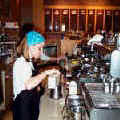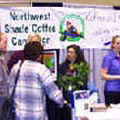|
作者:艾許莉•帕金森 (西北樹蔭咖啡運動組織)
2002年1月11日 星期五
美國,華盛頓州,西雅圖--今天我預定要和運動同仁們進行一次重要的電話會議。儘管還沒拿到共同申請的補助金,我們已經開始籌畫,連同幾家全國最大的特選咖啡商舉辦一次活動來促銷樹蔭咖啡。你或許認得這些公司-其中幾家擁有遍佈全國的連鎖店-但我保證這場活動絕對沒有你想的那樣「引人注目」。千萬別以為會有粗暴喧鬧的抗議者在星巴客外頭反覆嘶喊著:「喝咖啡,不喝鳥血!」而是,試著想像:商業企畫、供應商契約、認證標準,以及宣導手冊。

有機咖啡的絕佳風味就在「熱力咖啡」。照片版權歸屬:西雅圖奧杜邦學會
這種作法或許沒那麼花俏、吸引人,但才是最後會成功的方式。對一家廠商施壓絕對會使得他們全部都不信任我們。我們發現,重要的是建立良好關係、使合作過程盡量簡單,以及由過去的經驗提供具說服力的證據。由於如此低調堅持,我們才能在今春宣布「熱力咖啡」正式開幕,這是一間在地的、完全有機的咖啡烘焙與販售商店。終於,大部分與我們合作的咖啡商,不論全國或地區性的,有了進步的根基與顧客-他們都想做正確的事。
個人咖啡消費者也是如此。我們的主張沒有堅實的研究基礎,但得到的回應總是正面的。問題在於發聲。我們不可能在黃金時段播放廣告,或在每個角落豎立宣傳看板,但總有其他吸引注意力的方法。去年春天有場慈善音樂會,堪稱近來西雅圖最盛大的活動之一,就是由我們的聯盟夥伴「鳴鳥基金會」所發起的,參與者包括丹尼•歐基夫(Danny O'Keefe), 邦妮•瑞特(Bonnie Raitt),傑克森•布朗(Jackson Browne),以及凱•伯莫(Keb'Mo')等。
不過我通常致力於由義工支援的小型活動。現在,我正動員這些同仁們,在西雅圖居家展覽的一部份「環境博覽會」擺一個攤位。我們的構想是,提供咖啡測試並準備資料供民眾索取。樹蔭咖啡的一個最大賣點在於它比快速生長的日光咖啡豆多了分與生俱來的香甜,少了分苦澀。對大部分的人來說,品質、口味、健康、便利性-而非環境考量-是購買咖啡時的決定要點。所以我們強調樹蔭咖啡的口味、有機栽培以及高品質。我不介意為了迎合消費者而調整、修飾我們的訊息,只要中心訴求被接收到了就好。

咖啡解說義工。照片版權提供:奧杜邦學會
一個宣導樹蔭咖啡最新穎的點子是尋求教會的支持(我怎麼沒想到!)。想想:一般人做完禮拜會做些什麼呢?他們一塊兒喝咖啡聊天。樹蔭種植、公平交易的咖啡與許多牧師支持的社會、環境訴求一致;此外,教堂提供了強有力的媒介來教育其組成多元且忠誠的聽眾。如果我們與夠多的集會合作,消息就能在宗教社群間傳播開來,同時爭取到了另一個盟友,並且將訊息帶給平常不容易接觸到我們的人。
我們的義工們也參加賞鳥節,一邊用溫熱的咖啡暖和一雙雙冰冷的手,一邊談論鳴鳥冬天的棲息地。未來,我們組織將會與西北部的大專院校簽約合作,在校園的速食部及餐廳銷售樹蔭咖啡。至於下一步要做什麼,既然西北樹蔭咖啡運動組織只有唯一的職員-我,我願意嘗試一切的可能。
我大學曾在加州鳥類救護與復健中心實習,那時開始對鳥類生態產生興趣。當我跟獸醫和復健師一同工作時,我面對著那些北美鳥類,親眼看見了問題所在,而其中很多是人類造成的。我知道,大部分的人不像我,他們不會親眼目睹這些問題,不會造訪拉丁美洲的咖啡農場,就如同大部分的我們也不會親自去北極國家野生動植物保護區。我們懷抱著希望選擇保護這些地方,是基於個人的信念,是因為親慕大自然、認同永續生存的重要。就投入環保而言,飲用樹蔭咖啡是非常簡單的,然而它可以改變世界──一杯一杯地。
你可以在我們的網站上找到一份西北部樹蔭咖啡販售點的列表。全國性的認證樹蔭咖啡列表可到以下網站搜尋:史密森候鳥中心,雨林聯盟。(全文完)
【文章連載】
■樹蔭咖啡日記 (一) (二) (三)
(四) (五)
全文與圖片詳見:http://www.gristmagazine.com/grist/week/
parkinson011102.asp
版權歸屬 Earth Day Network,環境資訊協會(李珮華 譯,徐怡德 審校)
|
|
Friday, 11 Jan 2002
SEATTLE, Wash.--Today I've got a big conference call scheduled with our campaign partners. Even though we haven't yet received a grant we applied for jointly, we're beginning to plan a campaign involving some of the country's largest specialty coffee retailers to increase sales of shade coffee. You would probably recognize the companies -- some have stores across the country -- but I guarantee you that the campaign is less glamorous that you're thinking. Stop picturing rowdy protesters chanting "No more bird blood for lattes!" outside the local Starbucks. Think business plans and supplier agreements, certification criteria and educational brochures.

Organic caffinated goodness at Caffe Appassionato.Photo: Seattle Audubon
Society.
It may be less sexy, but it's what will work in the end. Putting pressure on one company is a sure way to make all of them mistrust us. We've found that building relationships, making the process as easy as possible, and providing convincing evidence based on past results is what matters. It's this low-key persistence that allowed us to announce this spring the opening of an all-organic Caffe Appassionato store, a local coffee roaster and retailer. In the end, most of the coffee companies we're working with -- whether they are national or regional -- have progressive roots and progressive customers; they want to do the right thing.
And it's the same with individual coffee drinkers. My evidence is anecdotal, but the response at our events is always positive. The problem is getting the word out. We can't run a TV commercial during prime time or put a billboard on every corner, but there are other ways to get attention. One of Seattle's recent high-profile events was a concert last spring sponsored by our coalition partner, the Songbird Foundation, that featured Danny O'Keefe, Bonnie Raitt, Jackson Browne, and
Keb'Mo'.
Usually, though, I concentrate on small events staffed by our volunteers. Right now, I'm mobilizing the troops to run a booth at the Environmental Expo, part of the Seattle Home Show. We plan to have a coffee tasting, and, of course, literature available at the table. One of the big selling points with shade coffee is that the flavor is typically sweeter and less bitter than coffee made from quick-growing sun beans. For most people, the choice of coffee is determined more by quality, taste, health, and convenience than the environment. So we talk up the flavor, the organic growing conditions, and the high quality. I don't mind modifying our message to meet the consumer, so long as the point is
taken.

Coffee-talking volunteers. Photo: Seattle Audubon Society.
One the most innovative ideas for spreading the word about shade-grown coffee (and I wish I'd thought of it), is enlisting churches. Think about it: What do people do after church? They drink coffee and talk. Shade-grown, fair-trade coffee is consistent with the social and environmental goals many ministries already support, and churches offer a powerful vehicle for educating a diverse and committed audience. If we sign on enough congregations, the word will begin to spread within the religious community, we'll gain another campaign ally, and we'll reach people who would not usually hear our message.
Our volunteers also attend birding festivals, warming cold hands with warm cups of coffee and talking about the winter habitat of songbirds. And in the future, the campaign will work with Northwest colleges and universities to sign agreements to sell shade-grown coffee in campus snack-bars and dining halls. As for what's next, since the Northwest Shade Coffee Campaign has a staff of one (me), I'm willing to try anything that will work.
I got interested in avian ecology during a college internship with the International Bird Rescue and Rehabilitation Center in California. As I worked with the vets and rehabbers, I saw first hand the problems -- many of them caused by humans -- facing birds in North America. I know that, unlike me, most people will never see these problems first hand; most will never travel to the coffee farms of Latin America, just as most of us will never see the Arctic National Wildlife Refuge. Hopefully, we choose to protect these areas anyway, because of our values and personal commitment, our appreciation for the natural world, and our recognition of the importance of living sustainably on the Earth. On the scale of environmental commitment, drinking shade-grown coffee is pretty easy, but it changes the world -- one cup at a time.
You can find a list of outlets that sell shade-grown coffee in the Northwest on our
website. National lists of certified shade-grown coffee are at the
Smithsonian Migratory Bird Center website and the
Rainforest Alliance
website.
http://www.gristmagazine.com/grist/week/
parkinson011102.asp
|
